
On September 29, 2025, Elpiscience, in collaboration with The Westlake University School of Medicine , the Chinese Society of Molecular Immunology, and Biomedical Innovation Group(BiG), successfully hosted the Symposium of Immunology Innovations: From Discovery to Therapy in Cancer and Autoimmune Diseases at Westlake University’s Yungu Campus in Hangzhou. Anchored on the global frontiers of immunology in both academia and industry, the symposium focused on oncology and autoimmune diseases—two major therapeutic domains driving immunotherapy innovation. The event aimed to convene world-leading minds, fostering deep cross-disciplinary dialogue between academia, clinical research, and industry, to accelerate the upgrade and leap of next-generation immunotherapies and promote global innovation and collaboration.
The symposium featured 13 distinguished scientists from leading global universities, research institutes, and biotech companies—including Harvard University, the University of Washington, the University of Chicago, Westlake University, Tsinghua University, Zhejiang University, Harbin Institute of Technology, Qihan Biotech, Strand Therapeutics, and Elpiscience. Centered on three major themes—Targeting T Cells, Targeting Myeloid Cells, and Technology and Clinical Advancement—the discussions spanned cutting-edge directions such as T cell engineering, myeloid cell biology, tumor microenvironment, CRISPR-based immune target identification, dendritic and granulocytic cell function, and translational medicine strategies. This high-level dialogue, combining academic depth with industrial foresight, attracted more than 300 participants from across the scientific and biopharmaceutical communities, generating renowned figures attended and an unprecedented response!
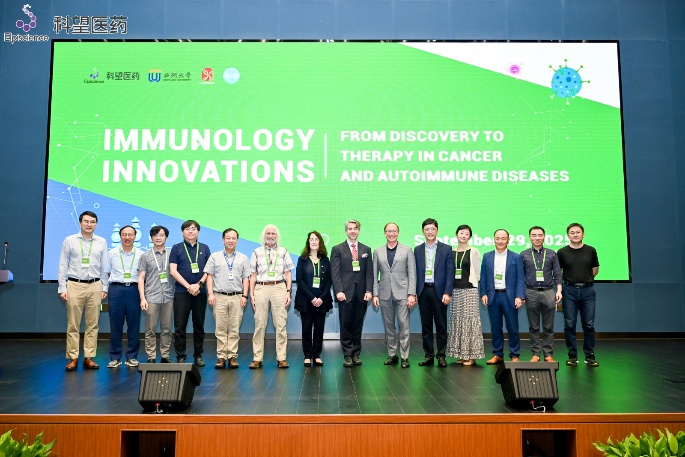
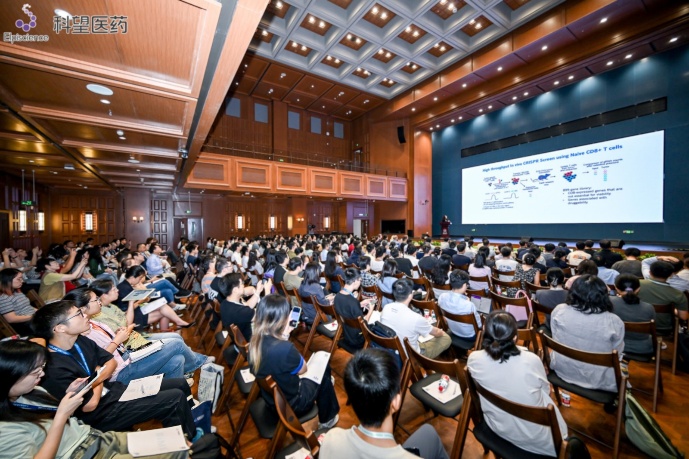
As the initiator of the symposium, Dr. Hongtao Lu, Co-founder and Chief Scientific Officer of Elpiscience, stated:“ Elpiscience is committed to pioneering scientific exploration, with immunology as its core driving force. We continue to deepen our focus and make breakthroughs in this field. Through this symposium, we aim to build a bridge connecting academia and industry, effectively accelerating the translation of fundamental immunological research into clinical applications rapidly, and transforming scientific leadership into tangible therapeutic benefits for patients as early as possible.”
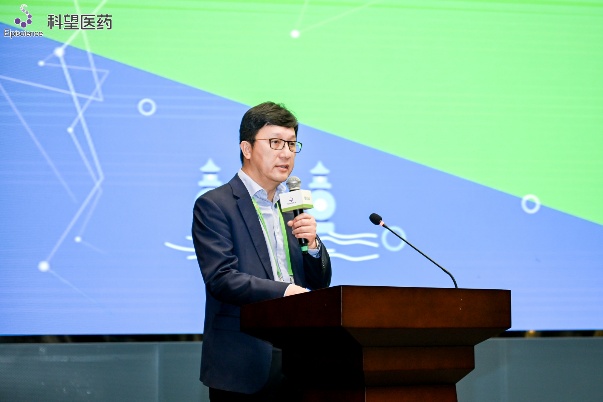
Dr. Hongtao Lu, Elpiscience
Dr. Darren Ji, Co-founder and Chief Executive Officer of Elpiscience, commented in his opening remarks:“ China’s pharmaceutical innovation is entering a new phase of rapid growth, with emerging achievements that are drawing increasing global attention. In-depth, high-level scientific exchanges serve as the bridge and engine driving continuous breakthroughs in biomedical innovation and accelerating industrial transformation. Elpiscience has strategically established a global and differentiated R&D pipeline in immunotherapy. Through extensive and deep academic dialogue, we hope to advance in sync with the world’s scientific and industrial progress.”
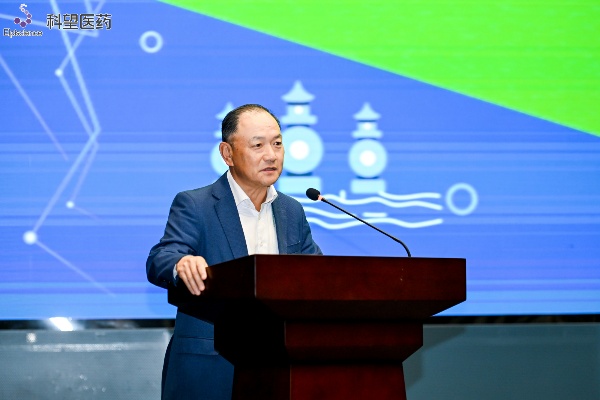
Dr. Darren Ji, Elpiscience
As a co-organizer of the event, member of the Chinese Academy of Sciences and Dean of The Westlake University School of Medicine, Dr. Chen Dong said: “Westlake University is dedicated to nurturing physician-scientists and advancing medical innovation. We are delighted to collaborate with Elpiscience and other partners to create this platform showcasing representative cutting-edge research in immunology to both academia and industry. We also hope to enhance global collaboration across the immunology community, jointly promote medical innovation, foster the next generation of scientific talents, and ultimately address patients’ real needs through fundamental innovation and promoting translational research.”
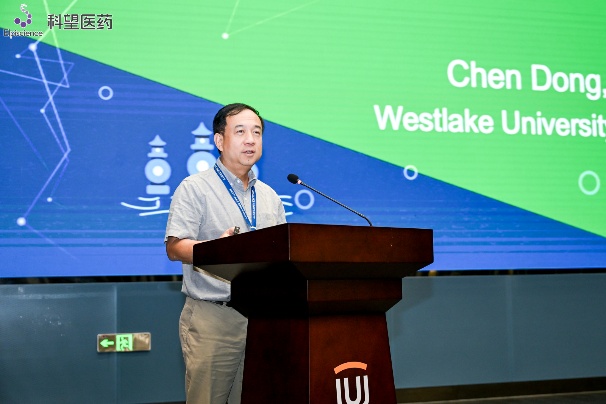
Dr. Chen Dong, Westlake University
In recent years, immunotherapy has evolved beyond being merely a “weapon against cancer” toward a broader paradigm of immune remodeling, forming a new, more systemic therapeutic framework. At the symposium, scientists from around the world presented the latest frontiers and future trends of the field, supported by first-hand data and forward-looking perspectives.
Breaking Traditional Boundaries: New Frontiers in T Cell Immunology
Globally, T cell–based therapies have shown rapid advancement and achieved many phased results, demonstrating remarkable efficacy across multiple cancer types. However, new technologies and strategies are urgently needed to overcome the translational and clinical challenges that remain. In the symposium’s first session, leading scientists shared their latest research breakthroughs on this rapidly evolving front.
Dr. Arlene Sharpe, Chair of the Department of Immunology at Harvard Medical School and member of the U.S. National Academy of Sciences and National Academy of Medicine, shared insights into the molecular mechanisms of PD-1 blockade and introduced the latest research utilizing in vivo CRISPR platforms to identify key genes regulating T cell function. Her studies revealed that PTPN2 and the E3 ubiquitin ligase STUB1 act as novel negative regulators of CD8⁺ T cells within the tumor microenvironment, suggesting they may serve as promising new therapeutic targets. Inhibitors of PTPN2 and STUB1 could thus represent a new generation of effective cancer immunotherapy strategies.

Dr. Arlene Sharpe, Harvard Medical School
Dr. Philip D.Greenberg, Professor at the University of Washington and Head of the Immunology Program at the Fred Hutchinson Cancer Center, presented his team’s pioneering work on engineering CD8⁺ and CD4⁺ T cells to achieve durable tumor suppression. His findings demonstrated that the TGF-β signaling pathway has an important anti-tumor effect on T cells and showed that intratumoral immune suppression can be reversed through modulation, thereby enhancing therapeutic efficacy. Additionally, his team engineered FAS-41BB–enhanced T cells and attempted to simultaneously modify CD4 T cells and CD8 T cells to reverse T cell exhaustion, thereby promoting the long-acting anti-cancer effect of T cell therapy.
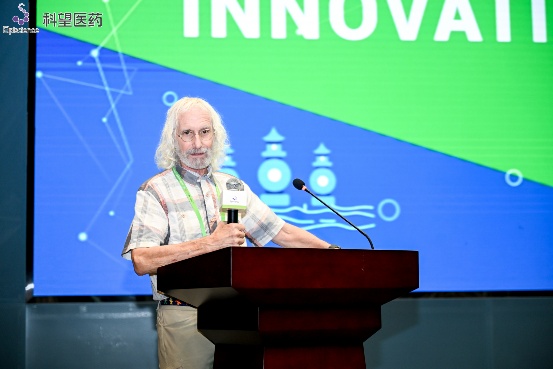
Dr. Philip D. Greenberg, University of Washington
Dr. Thomas Gajewski, Professor in the Departments of Pathology and Medicine at the University of Chicago and Leader of the Immunology and Cancer Program at the University of Chicago Comprehensive Cancer Center, explored new therapeutic targets in the tumor microenvironment. He highlighted the urgent need for novel strategies against “non–T cell–inflamed” tumors. Using RNA-seq analyses in animal models, his team successfully distinguished tumor-specific T cells from “bystander” T cells and identified two highly promising targets—GPR65 and KLRG1. Furthermore, PKCδ knockout technology was shown to offer a new approach to remodeling the tumor microenvironment.
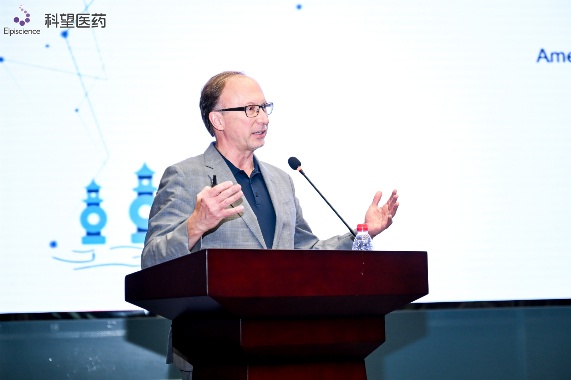
Dr. Thomas Gajewski, University of Chicago
PD-1/PD-L1 inhibitors and their combination with chemotherapy have become an important therapeutic option for HCC. Dr. Chen Dong, member of the Chinese Academy of Sciences, Vice President and Dean of The Westlake University School of Medicine, has successfully identified distinct T cell subpopulations associated with clinical response and resistance through his laboratory’s systematic analysis of the dynamic changes in CD8⁺ T cell subsets in liver cancer patients before and after receiving combined immunotherapy. This study provides mechanistic insights into the underlying causes of patient responsiveness or resistance to immunotherapy and offers theoretical guidance for enhancing cytotoxic T cell function and improving therapeutic efficacy.
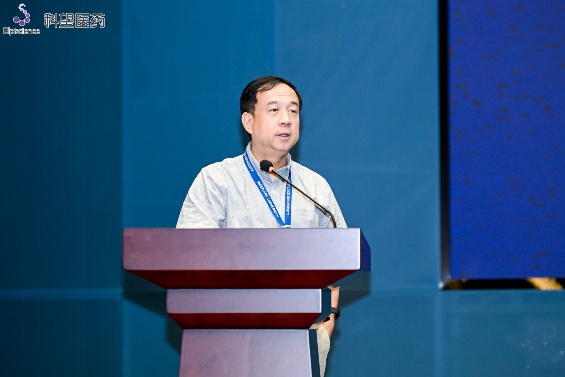
Dr. Chen Dong, Westlake University
Focusing on Myeloid Cells: A New Frontier in Immunotherapy
In recent years, mounting evidence has revealed the pivotal role of precisely targeting myeloid cells in immunotherapy. This area has thus emerged as a promising new frontier—often described as the next “blue ocean” of immunotherapeutic innovation. In the second session of the symposium, researchers shared their latest discoveries, demonstrating the vast potential of this direction and offering new perspectives for the field.
Dr. Ting Zhou, Researcher at Westlake University, presented his team’s work on the role of dendritic cell (DC) migration from the tumor microenvironment to lymph nodes in antitumor immunity. Through in vivo CRISPR screening, the team elucidated the mechanism by which the Pde5/cGMP signaling axis regulates DC migration and discovered that Pde5 inhibition effectively promotes DC trafficking, thereby enhancing antitumor immune responses and suppressing tumor growth. Based on these findings, they proposed sildenafil as a potential new immunotherapeutic strategy. This research was published in Nature in 2025.

Dr. Ting Zhou, Westlake University
Dr. Hongtao Lu, Co-founder and Chief Scientific Officer of Elpiscience, comprehensively introduced the latest research progress and mechanism breakthroughs of BiME® (Bispecific Macrophage Engager) platform in solid tumors. The studies demonstrated that BiME® exhibits potent and long-lasting antitumor activity in various tumor models with varying degrees of T cell infiltration, without safety side effects such as cytokine storm observed. Mechanistic analysis revealed that BiME® activates dendritic cells to specifically phagocytize tumor cells, thereby stimulating the expansion of CD8⁺ T cells within tumors and tumor clearance. Rechallenge experiments have confirmed that BiME® -induced CD8⁺ T cells possess persistent immunological memory while TCR sequencing has shown that they produce antigenic expansion effects and can even eliminate TAA-negative tumors. This achievement illustrated the "tumor immune cycle" pattern of BiME® by activating dendritic cells - CD8⁺ T cells.
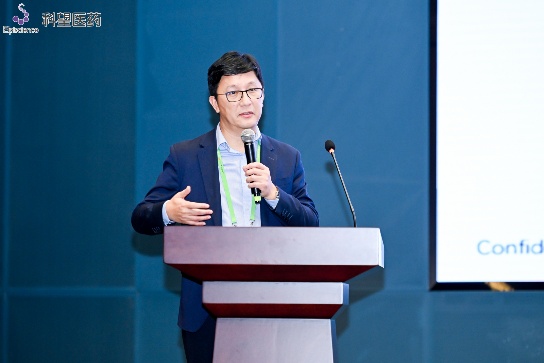
Dr. Hongtao Lu, Elpiscience
Innate immune cells are emerging as a powerful force in immunotherapy. Professor Jin Zhang, Tenured Professor and “Qiushi” Distinguished Professor at Zhejiang University as well as Core Principal Investigator at the Liangzhu Laboratory, presented his team’s breakthrough in developing an engineered induced pluripotent stem cell (iPSC)-derived CAR-macrophage platform for cancer immunotherapy. The team elucidated the biological mechanism through which myeloid cells and T cells collaborate to exert multifaceted immune functions. They have also successfully pioneered the use of in vivo CAR-macrophages in multiple preclinical models of cancer and autoimmune diseases, demonstrating strong therapeutic efficacy and safety potential.
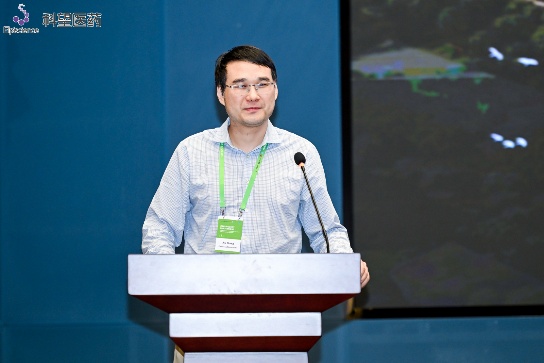
Dr. Jin Zhang, Zhejiang University
Dr. Xiaoyu Hu, Professor and Associate Dean at The Westlake University School of Medicine presented her team’s latest research on cytokine release syndrome (CRS) associated with immunotherapy. Her group uncovered the molecular mechanism of aberrant translational activation in macrophages during CRS and proposed translational regulation as a potential therapeutic target. Using RSK inhibitors (such as LJH685) as an example, pharmacological studies demonstrated that this approach effectively reduces IL-6 secretion and alleviates fever and neurotoxicity in humanized CRS mouse models—without compromising the antitumor activity of CAR-T cells.
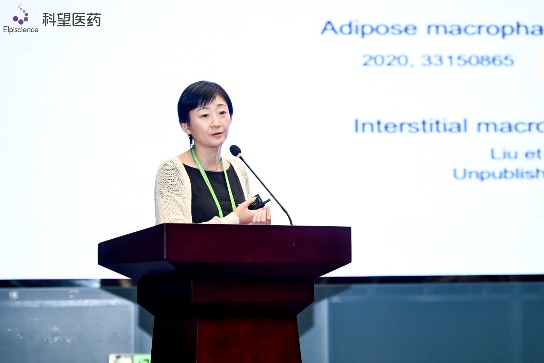
Dr. Xiaoyu Hu, Westlake University
Dr. Laiguan Ng, Professor and Ph.D. Supervisor at The Westlake University School of Medicine, and his team identified a novel surface marker, dcTRAIL-R1, that distinguishes the T3 subset of tumor-associated neutrophils (TANs). Combined with CD101, a marker differentiating immature and mature neutrophils, the team established an innovative classification framework for TANs. Building upon fundamental neutrophil functions, they further categorized tumor-associated granulocytes into immature tumor neutrophils (ITNs), mature tumor neutrophils (MTNs), and reprogrammed tumor neutrophils (RTNs), which can be applied to various human tumors. Among these, RTNs were found to exhibit stronger pro-tumor activity, and preliminary analyses identified specific cell types that interact with RTNs within the tumor microenvironment.
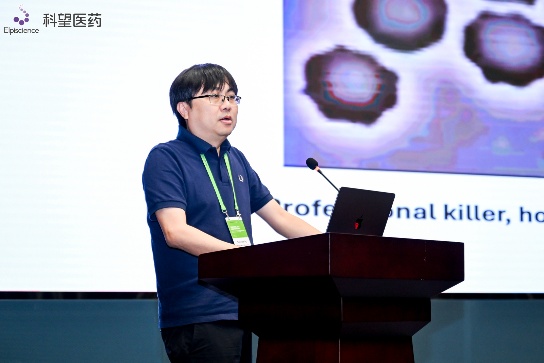
Dr. Laiguan Ng, Westlake University
Integrating Cross-Disciplinary Perspectives: Mechanisms, Technologies, and Applications
Immunotherapy is currently in its golden age, with an ever-expanding array of novel targets and strategies opening new possibilities for therapeutic innovation. In the third session of the symposium, scientists explored breakthrough research findings across multiple dimensions—from fundamental mechanisms and technological methodologies to translational and clinical applications.
Dr. Jason John Luke, Chief Medical Officer of Strand Therapeutics, shared his team’s integrative multi-omics research on multiple cancer cell types, which identified a set of promising druggable targets represented by P38. He noted that the P38-MAPK pathway is hyperactivated in several malignancies, suppressing immune cell infiltration as well as key immune functions such as IFN-α/β gene expression and MHC II antigen presentation. Subsequent studies revealed that targeting P38 in combination with PD-1 inhibition significantly improves clinical outcomes in patients with PD-1–refractory tumors.
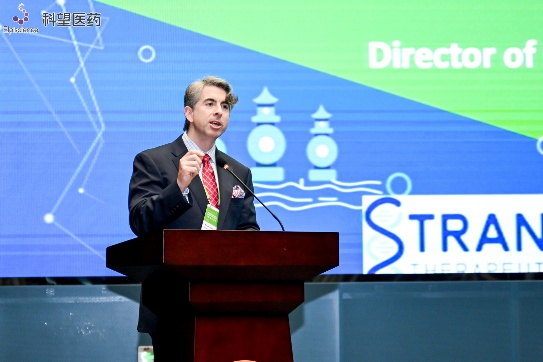
Dr. Jason John Luke, Strand Therapeutics
Dr. Yangxin Fu, Chair Professor of Oncology at Tsinghua University School of Medicine and the leading figure of the oncology discipline at Tsinghua University, introduced innovative strategies for converting “cold” tumors into “hot” tumors by reshaping the tumor microenvironment. His core approaches included: Utilizing membrane-anchored IL-12 as an mRNA vaccine adjuvant, which markedly enhances antitumor efficacy while minimizing systemic IL-12 toxicity. The addition of mtIL12 promotes the formation of a unique group of pre-effector T cells; Employing a tumor-targeted peptide–IL-2 prodrug (cis-NGR2-ProIL2) that synergizes with anti-PD-L1 antibodies in cold tumor models; Developing an anti-4-1BB–interleukin-15 fusion protein that both depletes tumor-infiltrating Treg cells and activates CD8⁺ T cells; Creating a CLDN18.2-targeted IL-2 prodrug (CLDN-ProIL2), through a dual-targeting mechanism, which enhances monoclonal antibody efficacy and ensures the safe, localized delivery of IL-2.
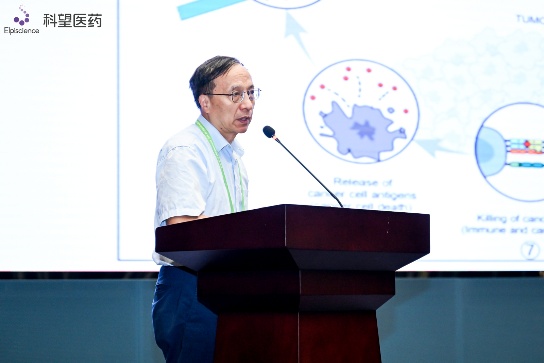
Dr. Yangxin Fu, Tsinghua University
Dr. Zhiwei Huang, Director of the School of Life Science and Medicine at Harbin Institute of Technology, presented his team’s discovery of a tunnel-like functional structure within the T cell receptor (TCR) that serves as a binding site for immunoregulatory molecules, directly modulating transitions among inhibitory, resting, and activated states of T cells. His team also, for the first time, structurally elucidated how γδ TCR recognizes endogenous phosphorylated antigens (PAgs) in tumor or infected cells through BTN protein complexes—providing a crucial structural foundation for the development of novel immunotherapies.
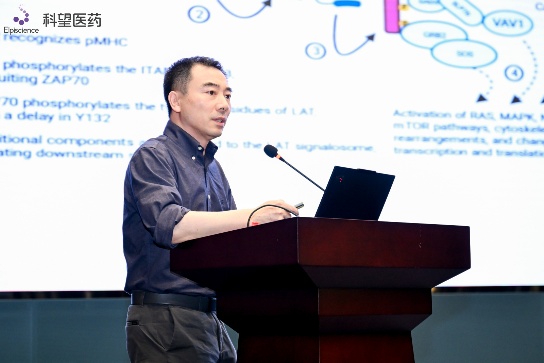
Dr. Zhiwei Huang, Harbin Institute of Technology
Dr. Luhan Yang, Co-founder and CEO of Qihan Biotech, introduced the company’s proprietary high-throughput gene-editing platform. Its representative product, QT-019B, is an “off-the-shelf” dual-target CAR-T cell therapy derived from healthy donor leukapheresis products. Through precise gene editing, the therapy targets CD19 and BCMA, while T cell receptor (TCR) expression is eliminated via gene knockout and multiplexable gene editing is employed to reduce immunogenicity—thereby minimizing NK cell- and T cell-mediated immune rejection in patients. Preclinical studies demonstrated potent efficacy, and preliminary clinical data also indicated promising safety and therapeutic potential.
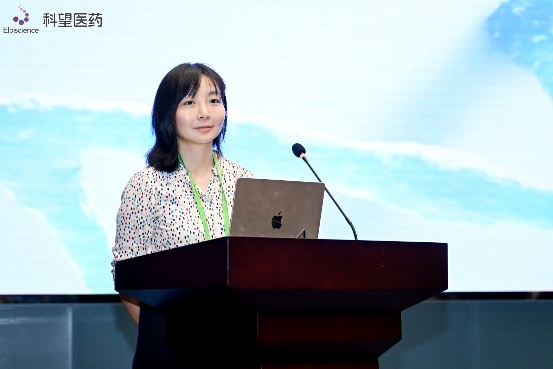
Dr. Luhan Yang, Qihan Biotech
The symposium concluded with vibrant discussions and dynamic exchanges between speakers and participants, presenting a true feast of ideas that bridged fundamental immunology research and industrial innovation. Building upon its leading expertise in oncology and autoimmune research, Elpiscience continues to accelerate target discovery and clinical development. Moving forward, the company will continue to build an international high-level communication platform to promote cross-border exchanges, convey global innovative and disruptive research results, and bring more breakthrough innovative therapies to patients through more innovative insights.
Corporate Communications:
PR@elpiscience.com
Partnering:
BD@elpiscience.com
